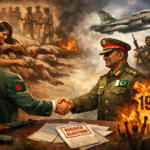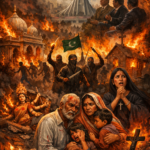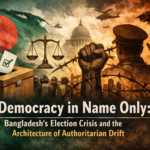Imagine a world gripped by the relentless drumbeat of escalating conflict between two nuclear-armed neighbours, India and Pakistan. For years, India has consistently accused Pakistan of orchestrating and supporting terrorist groups that launch attacks on its soil. Each incident leaves a trail of devastation, fueling public anger and ratcheting up pressure on the Indian government to act decisively.
In this hypothetical scenario, let’s say the frequency and severity of these attacks reach a breaking point. Perhaps a particularly heinous incident occurs, triggering widespread outrage across India. Feeling it has exhausted diplomatic avenues and facing immense domestic pressure, the government decides to take a more assertive stance. This could manifest in various forms, ranging from intensified military operations along the border to more targeted interventions within what India perceives as terrorist safe havens.
As India’s actions escalate, the international community watches with bated breath. Typically, in times of crisis between these two nations, calls for de-escalation and dialogue echo from global capitals. However, in this imagined reality, the response is markedly different. Pakistan finds itself increasingly isolated, the usual chorus of support and calls for restraint seemingly muted.
Why this isolation? Several factors could contribute to Pakistan’s predicament in this scenario:
The Weight of Evidence: Pakistan’s Alleged Sponsorship of Terrorism For years, India has presented evidence, shared intelligence, and pointed fingers at Pakistan for its alleged role in fostering terrorism. While Pakistan has consistently denied these accusations, the international community, particularly after decades of such incidents, might be increasingly inclined to believe India’s narrative, or at least acknowledge the significant problem of terrorism emanating from Pakistani soil. The Financial Action Task Force (FATF)’s grey listing of Pakistan for failing to curb terror financing and money laundering could have further eroded international trust.
Shifting Geopolitical Alignments: The global landscape is constantly evolving. China’s growing assertiveness and strategic partnership with Pakistan have been significant factors in the region. However, in a scenario where Pakistan is perceived as a source of instability and a potential trigger for a major conflict, even China might find its interests better served by maintaining a distance. China’s primary focus is its economic growth and global influence, and a volatile South Asia could significantly jeopardise these ambitions. The US Vice President’s hypothetical statement, “USA has nothing to do with it,” could reflect a broader weariness within Western powers regarding Pakistan’s role and a reluctance to get entangled in a potentially explosive situation.
India’s Growing International Standing: Over the past few decades, India has emerged as a significant economic power and a key player in global affairs. Its democratic credentials and growing strategic partnerships with various nations, including the United States, France, and others, lend it considerable diplomatic weight. In a situation where India is perceived as a victim of terrorism and is acting in self-defence, many countries might be hesitant to criticise its actions, especially if Pakistan is seen as unresponsive to repeated calls to address the issue of cross-border terrorism.
The “Enough is Enough” Sentiment: The hypothetical rise of Indian public sentiment, fueled by years of bloodshed, could also influence international perceptions. The world might recognise the limits of India’s patience and understand its desire to protect its citizens. This doesn’t necessarily condone any excessive action, but it could create a context where Pakistan’s usual appeals for international intervention fall on deaf ears.
The Liability Factor: The statement that “China perhaps thinks of Pakistan is more of a liability than an asset” is particularly telling. While the China-Pakistan Economic Corridor (CPEC) and their strategic alliance have been cornerstones of their relationship, a Pakistan embroiled in a major conflict and facing international condemnation could become a significant burden for China. It could strain China’s relations with other countries and potentially disrupt its regional economic interests.
The Absence of Vocal Allies: The lack of any significant international power in Pakistan’s defense would starkly indicate its isolation. Traditional allies might offer lukewarm statements calling for peace but refrain from any concrete support or condemnation of India. This silence would speak volumes about Pakistan’s diminished international standing in this hypothetical crisis.
The Humanitarian Implications: While the focus here is on Pakistan’s isolation, it’s crucial to acknowledge the potential humanitarian catastrophe that could unfold in such a scenario. Any large-scale conflict between India and Pakistan would have devastating consequences for millions of people on both sides of the border. The international community’s reluctance to intervene might stem from a fear of exacerbating the conflict and triggering a wider regional crisis.
In conclusion, the hypothetical scenario paints a grim picture of Pakistan facing unprecedented international isolation as tensions with India reach a boiling point. The confluence of alleged state-sponsored terrorism, shifting geopolitical alignments, India’s growing influence, and a potential weariness within the international community could leave Pakistan feeling orphaned and vulnerable. The absence of strong allies, even traditional ones, would underscore the severity of its predicament. While this is a hypothetical exploration, it highlights the critical need for de-escalation, dialogue, and a genuine commitment from all parties to address the root causes of conflict in the region to prevent such a devastating scenario from becoming a reality.






